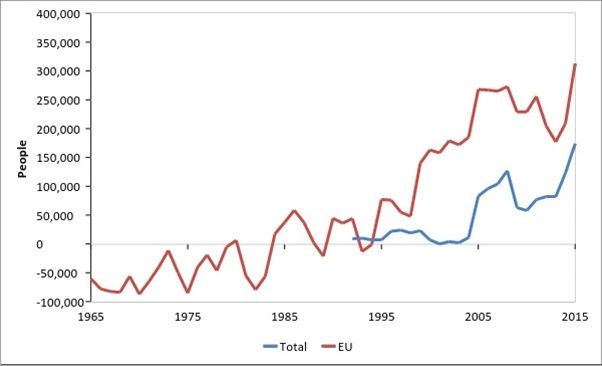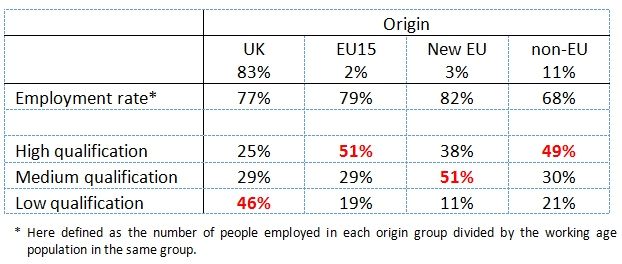This Thursday, June 23rd, the UK will face an in-out referendum on the membership of the EU. Immigration is the deciding factor for many referendum voters. From outside of the country it might be difficult to understand why. In this blog we will try to explain the reason why this issue is so important and why it should not be.
Between 1990 and 2015 the net migration in the UK has increased from under 50K to over 300K per year (Figure 1). The proportion of immigrants[1] has increased from 6% in 1990 to 12% in 2013 (OECD). In 2004 the UK experienced a large inflow of immigrants from the new EU countries, because the UK was one only three countries[2] that opened its labour market to their citizens. Global financial crises and the recession that followed shortly after has brought migration to the front pages of newspapers and made it a central political issue. The UK government pledged to reduce the net migration “from hundreds of thousands to the tens of thousands” – a promise which it could not keep, given the free movement of people in the EU.
Figure 1. Net migration to the UK
Source: ONS long-term international migration series
Control over immigration from the EU countries became one of the main arguments for the Leave campaign. The main arguments against immigration are competition for public services, negative impact on the labour market and welfare tourism.
Unsurprisingly, there is a lot of research on immigration in the UK. The two areas that attract the most attention are effects on the labour market and public finances. The consensus among the researchers studying the impact of migration on the labour market seems to be that immigrants do not have strong effect on labour market outcomes of native workers. Most studies do not find significant impact on native’s wages and the unemployment rate. Nickell and Saleheen (2015) found that the immigrant-native ratio has a significant but very small negative impact on the average occupational wage rates in the region in the semi/unskilled services sector. This blog discusses in more detail “how small is small”.
The most comprehensive study of the fiscal impact of immigration in the UK was conducted by Dustmann and Fratinni (2013). They computed the net fiscal contribution of the different population groups for each year between 1995 and 2011. They found that the contribution of recent immigrants (i.e. those who arrived after 1999) has been consistently positive. Recent EU immigrants contributed 34% more to the fiscal system than they took out, and recent immigrants from non-EU countries contributed about 2% more than they took out. More details in this blog.
The reason for this is that the UK is successful in attracting highly educated migrants who are attracted by employment opportunities rather than by the welfare state. Table 1 summarises labour market characteristics of workers from different origins. Immigrants have higher educational attainment than the UK-born population on average. They also have high employment rates – especially immigrants form the new EU countries. In general EU immigrants benefit the UK economy for two main reasons – they are on average much younger and are more highly qualified than the general population.
Table 1. UK Labour market characteristics by origin
Source: own calculations based on Annual Population Survey (APS) and Department for Work and Pensions (DWP) data
So although the UK experiences high levels of immigration, it is lucky to attract highly educated young immigrants, who pay more than their share for the public services bill and do not have strong negative effect on its labour market.
Attention
The author doesn`t work for, consult to, own shares in or receive funding from any company or organization that would benefit from this article, and have no relevant affiliations





